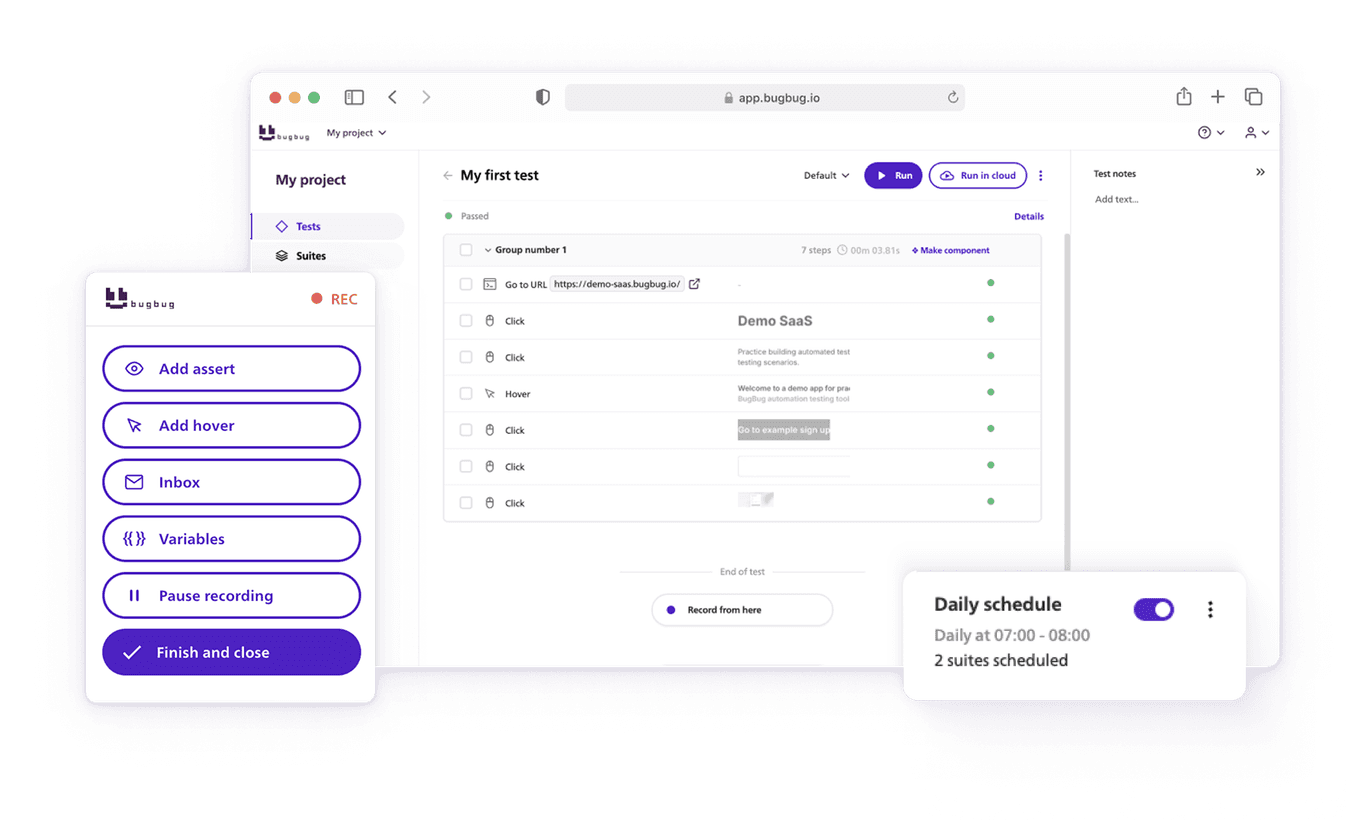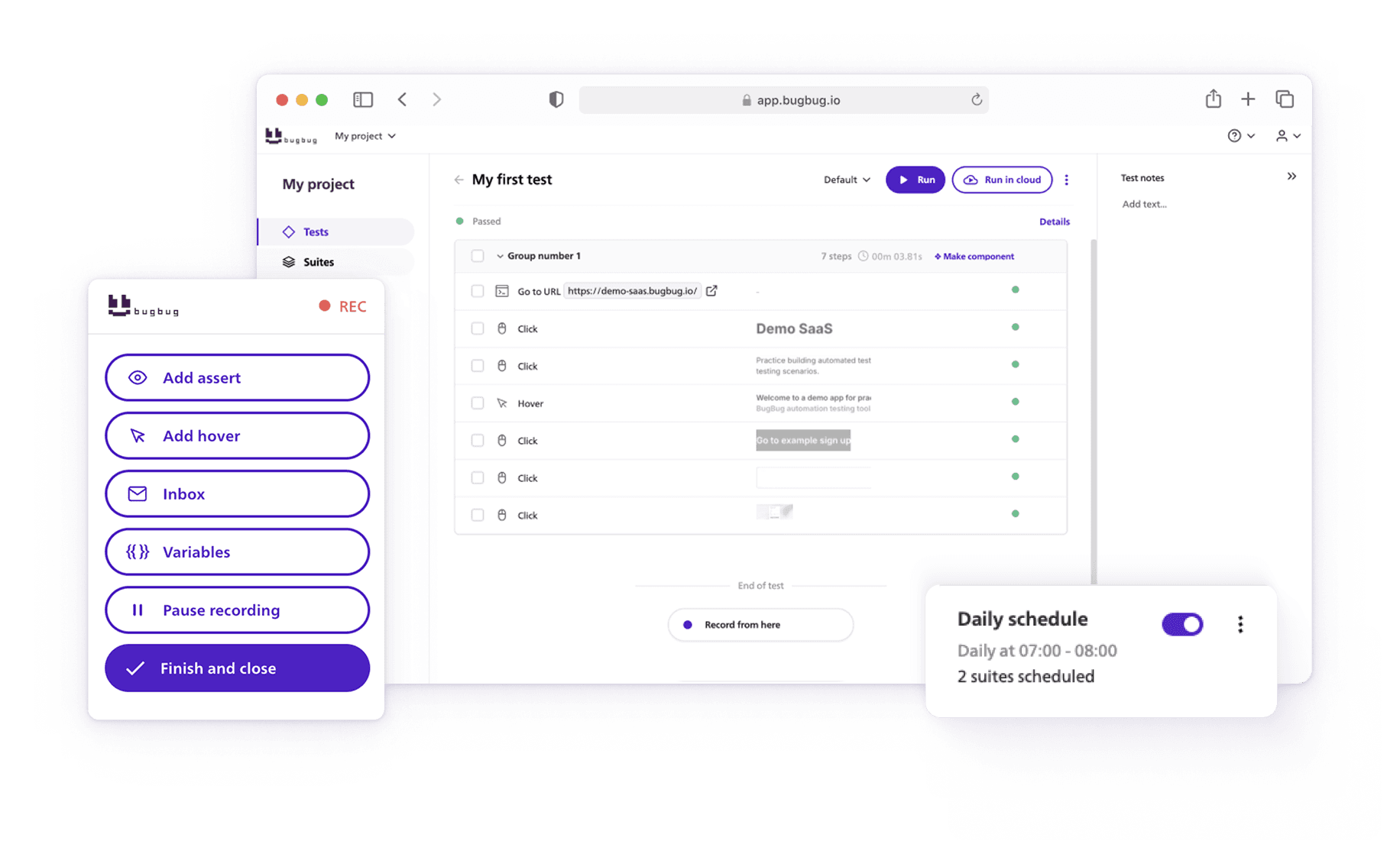The modern QA role is a blend of technical prowess and soft skills that keeps the software running smoothly and makes sure you're always one step ahead of any potential issues. This is the ultimate mix of skills for QA, ensuring that you’re not just part of the process but a critical force driving high-quality software testing and user satisfaction.
🎯TL;DR - QA Tester Skills
- Blend of QA Skills: QA roles in 2025 require a mix of technical prowess and soft skills to ensure smooth software performance and user satisfaction.
- Technical Mastery: Proficiency in coding, automation tools, and cross-platform testing is essential for efficient and effective QA processes.
- Critical Thinking: Analytical and problem-solving skills are key to identifying and addressing potential issues early in the development cycle.
- Continuous Learning: Staying updated on new tools, methodologies, and best practices ensures QA engineers remain valuable contributors to the software development lifecycle.
Check also:
QA Skills Needed to Become Quality Assurance Professional in 2026
In 2025, being a QA engineer is like stepping into the role of a high-tech detective. You’re not just on the lookout for bugs; you’re the one ensuring that every user’s journey through the software is flawless, no matter what device they’re on. The skills required for this job go far beyond just knowing how to run tests. It would help if you were agile, tech-savvy, and a master at communication—especially when it comes to collaborating with developers and analysts. Whether you're deep into coding, automating tests, or navigating the SDLC (Software Development Life Cycle), your ability to communicate findings and solutions effectively is crucial.
💡 QA vs QE - Learn the Difference from our guide.
Technical Proficiency
At the heart of a QA engineer's role is technical background. This includes proficiency in programming languages such as Python, Java, or JavaScript, which are essential for writing automated test scripts. With the rise of automated testing, tools like Selenium, Cypress, and JUnit have become crucial for efficiently managing repetitive testing tasks. Additionally, QA engineers must be comfortable with test management tools and continuous integration/continuous deployment (CI/CD) pipelines, which are integral to modern software development processes.
Automate your tests for free
Test easier than ever with BugBug test recorder. Faster than coding. Free forever.
Get started
Cross-browser and cross-platform testing skills are also indispensable, especially with the proliferation of devices and operating systems. QA testers must ensure that software functions seamlessly across various environments, which requires familiarity with mobile app testing and the ability to execute tests on real devices to simulate real-world conditions.
Analytical and Problem-Solving Skills
QA engineers must possess strong analytical skills to anticipate potential issues, identify bugs, and understand their root causes. This involves not just finding bugs, but also conducting root cause analysis to prevent similar issues in the future. In the context of agile development, where iterative testing and feedback are key, these skills enable QA testers to contribute significantly to improving the overall software quality.
Performance engineering is another critical area, especially as software systems need to handle increasing user loads. QA engineers specializing in load testing and scalability testing ensure that software performs well under varying conditions, which is vital for maintaining user satisfaction and trust.
💡 10 Tips on Finding Bugs in Your Code
Soft Skills: Communication and Collaboration
While technical skills are fundamental, soft skills are equally important in a QA engineer’s toolkit. Effective communication skills are necessary for collaborating with developers, product managers, and other stakeholders. QA testers must be able to articulate issues clearly, provide actionable feedback, and ensure that everyone involved in the software development lifecycle understands the impact of potential bugs.
Moreover, the ability to work independently as well as within a team is crucial. QA engineers often need to coordinate with various team members, and in some cases, lead the testing efforts. This requires strong organizational skills to manage tasks efficiently and time management skills to handle multiple projects simultaneously.
Adaptability and Continuous Learning
The technology landscape is rapidly evolving, with new tools, languages, and methodologies emerging constantly. QA engineers must be proactive in learning new technologies and adapting to changes in the software development process. This includes staying updated on the latest in AI-driven testing, security testing, and IoT testing, as these areas are becoming increasingly relevant in today’s market. Additionally, understanding and implementing DevOps practices within QA processes is becoming essential. QA engineers must ensure that their testing strategies align with continuous integration and deployment goals, facilitating a smoother and more reliable software delivery process.
Automate your tests for free
Test easier than ever with BugBug test recorder. Faster than coding. Free forever.
Get started
Automation Expertise
QA Automation is now a cornerstone of effective testing process. QA engineers must not only be proficient in writing automation scripts but also in identifying which tests should be automated versus those that require manual intervention. Automated testing helps accelerate the testing process, reduce human error, and ensure comprehensive coverage of software features.
Attention to Detail and User Experience Focus
QA engineers must have a keen attention to detail to catch even the smallest defects that could affect the user experience. In mobile app testing, for example, this might involve ensuring that an app works flawlessly across various screen sizes, operating systems, and network conditions. Understanding the end-user’s perspective is crucial for ensuring that the software not only meets technical requirements but also delivers a smooth and intuitive experience.
Best Practices for Future QA Testers

As the role of QA continues to evolve, so too must the practices that ensure success in this field. Here are some best practices for aspiring and current QA professionals to keep in mind:
Develop Both Soft and Hard Skills
To become a top QA tester, you'll need a balance of soft and hard skills. While technical expertise in areas like automation testing and coding is crucial, don't overlook the importance of communication and teamwork. QA engineers must be able to break down complex issues and explain them clearly to software developers and other team members. This combination of skills ensures that you can test the product effectively and work smoothly with the entire QA team.
Focus on Real-World Scenarios
Quality assurance engineers must think beyond theoretical testing and focus on real-world scenarios. This means designing test cases that mimic how end-users will actually interact with the product. By simulating real user conditions, you can ensure a product's quality in practical terms, which is an essential part of effective QA.
Stay Updated with Testing Methods
QA professionals must keep their knowledge of testing up to date. As software development evolves, so do testing methods. QA engineers need to be familiar with both manual and techniques, ensuring they can apply the best approach depending on the situation. This continuous learning will keep you at the top of your game in complex technical environments.
Think Critically and Anticipate Issues
One of the most critical skills that a QA engineer can develop is the ability to think critically and anticipate issues before they arise. Testers need to think like end-users but also understand the technical complexities of the software. This dual perspective allows you to be able to spot potential problems early in the development cycle, ensuring smoother software releases.
Enhance Your Communication Skills
QA isn't just about finding bugs; it's about ensuring the entire development team is aware of potential issues and how to resolve them. This means you must be able to communicate effectively with developers, product managers, and stakeholders. QA professionals must be able to clearly articulate the problems they discover and collaborate on solutions, making communication a vital part of the job of a QA tester.
Master Automation Testing
As automation continues to grow in importance, mastering automation testing is becoming a must for QA engineers. Not only should you be able to write and execute automated tests, but you should also know when to apply them. Automation testing is crucial for handling repetitive tasks and ensuring accurate results across various scenarios, freeing up time to focus on more complex testing needs.
Understand the SDLC and Work Closely with Developers
QA testers are an essential part of the software development lifecycle (SDLC). Understanding the SDLC allows you to integrate QA processes at every stage, from planning to deployment. QA professionals must also work alongside software developers to ensure that testing is an integral part of the development process, not just an afterthought.
Adapt to New Tools and Technologies
The tools and technologies used in QA are constantly evolving. QA engineers need to stay adaptable, learning new tools that enhance their testing capabilities. Whether it's a new automation framework or a tool for real-world scenarios testing, being flexible and open to learning will ensure you remain valuable in the ever-changing field of quality assurance.
By following these best practices, future QA testers can ensure they are well-equipped to handle the challenges of their role and contribute significantly to the success of their teams and products.
Automate your tests for free
Test easier than ever with BugBug test recorder. Faster than coding. Free forever.
Get started
Additional Resources for QA Professionals
QA Engineer Skills in 2026 - Final Thoughts
To thrive in this role, you need a combination of technical know-how, business insight, and interpersonal skills. It’s essential to be agile, adaptable, and capable of juggling multiple tasks in fast-paced environments that rely on agile methodologies. QA professionals are deeply embedded in the software development team, participating in daily standups, sprint planning, and retrospectives. In many cases, a QA engineer works closely with developers and product owners to define testable requirements and ensure quality from the ground up.
Hands-on experience with both manual testing and test automation is non-negotiable
Whether you're using codeless testing tools or writing automated scripts, the ability to understand when and how to automate is critical. You’ll also need solid foundations in performance testing to make sure that applications are not only functional but scalable and responsive under stress.
Being familiar with version control systems like Git is now a baseline expectation
Testers often collaborate on code repositories, manage test scripts, and validate features in real-time alongside developers. A working knowledge of web development technologies (like HTML, CSS, JavaScript) and popular coding languages enhances your ability to write better test scripts and pinpoint issues faster.
Academic credentials still hold value—many employers prefer candidates with a background in computer science or a related field—but in 2025, your ability to continuously learn and adapt is what will really set you apart in the job search. Employers are increasingly looking for QA professionals who can take initiative, contribute across the testing cycles, and drive quality from day one.
In essence, being a software tester in 2025 means being a technical communicator, a team player, and an ever-evolving problem solver. You’re not just finding bugs—you’re helping to build better software, faster.
Happy (automated) testing!



